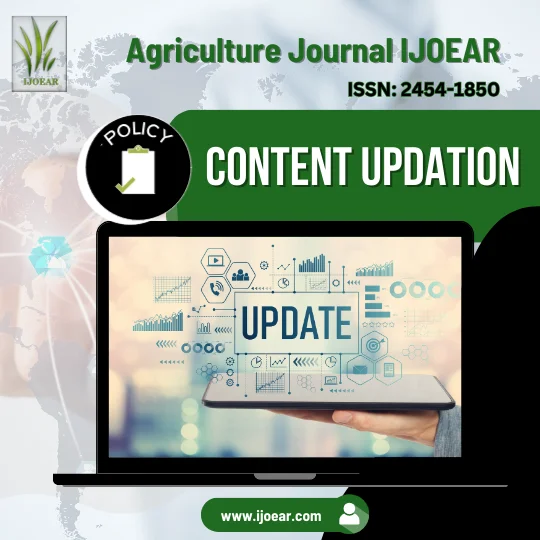 November 2025 Articles
November 2025 Articles Impact Factor: 6.69
Impact Factor: 6.69  Submit Article
Submit Article 
|
Citation Indices
|
All
|
Since 2020
|
|
Citation
|
6164
|
5117
|
|
h-index
|
31
|
29
|
|
i10-index
|
201
|
165
|
|
Acceptance Rate (By Year)
|
|
|
Year
|
Percentage
|
|
2024
|
11.09%
|
|
2023
|
15.23%
|
|
2022
|
12.81%
|
|
2021
|
10.45%
|
|
2020
|
9.6%
|
|
2019
|
14.3%
|
|
2018
|
17.65%
|
|
2017
|
16.9%
|
|
2016
|
22.9%
|
|
2015
|
26.1%
|

The International Journal of Environmental and Agriculture Research (IJOEAR), ISSN 2454-1850 (online), is dedicated to maintaining the integrity and accuracy of its published articles. As a scholarly journal committed to open access and ethical publishing, we understand that authors may occasionally need to request minor updates to their published work. However, updates are only permitted under specific conditions and must follow the guidelines outlined in this policy.
The Content Updation Policy ensures that any corrections or modifications made to published articles uphold the credibility of the academic record while minimizing disruptions to the accessibility of previously archived versions. Authors are strongly encouraged to thoroughly review their work before submission to reduce the need for post-publication updates.
The policy serves the following objectives:
Authors are notified in the acceptance letter that rectifications or updates to published articles are generally not permitted.
However, under specific circumstances, one-time minor updates may be considered.
Content updation refers to minor changes or corrections that do not alter the core findings or conclusions of the published article. These include:
As an open-access journal, IJOEAR articles can be freely downloaded and stored in various repositories worldwide. Examples include platforms like ResearchGate, Turnitin, iThenticate, and Scribd.
Once an article is published, the journal cannot ensure updates in these external repositories.
Any corrections made post-publication will only reflect in the journal's official database (PDF and HTML versions).
The journal and its publication house are not responsible for discrepancies in older versions stored externally.
Authors who wish to request updates must follow these steps:
The corresponding author must submit an application to the editorial office via email.
The application must clearly specify the nature of the correction, including a detailed explanation and supporting documentation.
The editorial team will evaluate the request to ensure it meets the criteria for minor updates.
If approved, the team will coordinate with the production department to implement the changes.
The updated article will replace the original version in the journal's database.
A notice stating that the article has been updated will be added to the article’s metadata for transparency.
Once updates are implemented, no further changes to the article will be allowed.
Authors are encouraged to thoroughly verify the updates during the review process.
Authors are responsible for:
The editorial team is responsible for:
Open-access publishing promotes the unrestricted sharing of knowledge, allowing articles to be downloaded, stored, and cited globally.
While this enhances accessibility, it also poses challenges for content updation.
Once published, articles are often archived in repositories like ResearchGate or university libraries.
Updates made to the journal’s official version may not reflect in these external archives.
Older versions of articles may continue to be cited, even after updates are made.
Authors should ensure that their update requests are justified and necessary to avoid confusion in the academic record.
To provide clarity, here are examples of acceptable and unacceptable updates:
No, only one-time updates are permitted per article. Authors should ensure that all corrections are included in a single request.
No, updates will only reflect in the journal’s official database. External repositories may continue to display the original version.
Update requests are typically processed within 7–14 working days, depending on the complexity of the corrections.
No, the policy strictly limits updates to minor corrections. Major changes require retraction and resubmission as a new article.
The Content Updation Policy of IJOEAR balances the need for accuracy with the integrity of the scholarly record. By providing a clear and structured process for minor updates, the journal ensures that authors and readers can trust its content while maintaining the accessibility and transparency of open-access publishing.
Authors are encouraged to carefully review their work before submission and to communicate promptly with the editorial office for any necessary updates.
For further information or assistance, please contact the editorial team.
For any queries or additional information, authors can contact the editorial team via email at info.ijoear@gmail.com or info @ijoear.com.com .